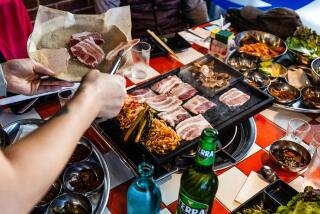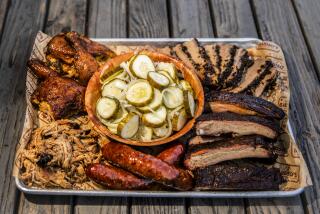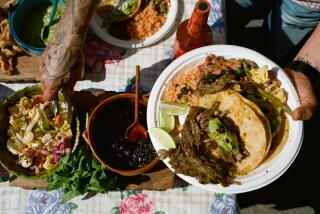The Barbecue Way of Life
- Share via
So the Air Quality Management District wants to outlaw starter fluid in barbecues. We really have come to a watershed. This will destroy one of the thrills of barbecuing as we know it: standing a couple of feet back from the coals and squeezing out an impressive arc of fluid and getting second degree burns on your forearm.
The AQMD doesn’t understand. Barbecue is supposed to be dangerous. It’s supposed to be an elemental confrontation, like that of a guy and a wild animal in a bullring. Or in this case, a guy, a fire and a dead animal in a back yard.
But look at what’s happened. First the women wanted to get involved, and they brought along salads and vegetables and desserts. And then restaurant chefs, unhinged by exposure to Tuscan cuisine and California cuisine, turned barbecuing into something altogether different called “grilling.” They made it exquisite and aesthetic and safe.
They may have made it tasty, to be sure. But barbecue, real barbecue, was always about much more than food. It was a social ritual; a symbolic, ritualistic, socio-cultural affirmation of Dad’s socio-culturo-alimentary role in the family. The breadwinner bringing home the bacon and showing it the business end of an inferno.
Think about it. A back-yard barbecue was about the only occasion in domestic life requiring a uniform. You couldn’t do proper barbecue unless you were wearing an apron printed with self-mocking boasts and titles (in the republic of barbecuing, every guy is at least a Champion or a World Famous chef).
Then the noble, superbly silly eminence of the chef’s hat, not used for any other sort of home cooking . . . not even chile. And the armaments: spatula, fork, possibly a brush or mop to apply the Secret Sauce. Some guys had to outfit their Weber kettle with half a dozen gadgets hanging from its belt just to get started.
And then the lonely watch of establishing the bed of coals. A solitary figure stands in this back yard, doing what has to be done, without whimpering, without grandstanding; tending his tribe’s fire with the same stick-to-it-iveness with which he’ll go around the house later that night and turn off all the lights.
Barbecue symbolized domestication, but domestication freely accepted, and so it implied the chef still really owned his freedom. Barbecue meant that any burger-blackening guy was as one with a footloose cowboy or a wandering mastodon-chaser, because he struggled with the same elements they did, wresting sustenance from the spoils of the hunt.
Barbecue wasn’t cooking. It was work . Cooking was for ladyfolk; barbecuing was more like steel-puddling.
Not that the women and the grill chefs are wrong for trying to make a simple thing complicated. The essence of barbecue--a guy, a fire and a dead animal--is impervious to change.
And anyway, male chefs don’t mind complication. On the contrary, they love it. They believe in it. Like chile chefs, back yard barbecue mavens have always been sure there’s a secret that has to be learned and passed down. A secret ingredient, a secret technique. Maybe beer in the marinade, or tequila in the Secret Sauce.
I once incinerated a couple of birds up near Bishop with a guy whose traditional family Secret Sauce summed up the whole barbecue phenomenon, and even opened new vistas on what barbecue was supposed to be. It was simply equal quantities of rum and melted butter.
Do you see the cleverness of it? Butter and rum are both flammable. This sauce actually made the barbecue taste fairly awful, but when you poured it on the cooking meat it caught fire like a charm. It was almost as great for playing around with as starter fluid.
Let’s see the AQMD try to outlaw butter and rum.
More to Read
Eat your way across L.A.
Get our weekly Tasting Notes newsletter for reviews, news and more.
You may occasionally receive promotional content from the Los Angeles Times.










